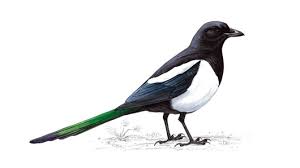记忆方法
记忆“magpie”可以使用联想法,联想一个“magnificent”(壮丽的)和“pie”(馅饼)的大鸟。想象一只外形壮观,像大馅饼一样的鸟,以此来帮助记忆这个鸟的名字“magpie”。
以上内容由AI生成, 仅供参考和借鉴
中文词源
magpie 喜鹊
mag,来自常见女性名Margaret昵称,通常用来指爱唠叨的女子,pie,鹊名,来自拉丁语picus,啄木鸟。需注意的是,这种鸟在欧洲中世纪时通常被视为不祥之兆。
英语词源
- magpie
-
magpie: [17] The original name of the magpie was simply pie, which came via Old French from Latin pīca. This is thought to go back ultimately to Indo-European *spi- or *pi-, denoting ‘pointedness’, in reference to its beak (the Latin masculine form, pīcus, was applied to a ‘woodpecker’). Pie arrived in English as long ago as the 13th century, but not until the 16th century do we begin to find pet-forms of the name Margaret applied to it (one of the earliest was maggot-pie).
By the 17th century magpie had become the institutionalized form. Some etymologists consider that the term for the edible pie comes from the bird’s name, based on a comparison of the miscellaneous contents of pies with the board of assorted stolen treasures supposedly accumulated by the magpie.
=> pie - magpie (n.)
- the common European bird, known for its chattering, c. 1600, earlier simply pie (early 13c.); first element from Mag, nickname for Margaret, long used in proverbial and slang English for qualities associated generally with women, especially in this case "idle chattering" (as in Magge tales "tall tales, nonsense," early 15c.; also compare French margot "magpie," from Margot, pet form of Marguerite).
Second element, pie, is the earlier name of the bird, from Old French pie, from Latin pica "magpie," fem. of picus "woodpecker," from PIE root *(s)peik- "woodpecker, magpie" (cognates: Umbrian peica "magpie," Sanskrit pikah "Indian cuckoo," Old Norse spætr, German Specht "woodpecker"); possibly from PIE root *pi-, denoting pointedness, of the beak, perhaps, but the magpie also has a long, pointed tail. The birds are proverbial for pilfering and hoarding, can be taught to speak, and have been regarded since the Middle Ages as ill omens.Whan pyes chatter vpon a house it is a sygne of ryghte euyll tydynges. [1507]
Divination by number of magpies is attested from c. 1780 in Lincolnshire; the rhyme varies from place to place, the only consistency being that one is bad, two are good.
权威例句
- 1. A born magpie, Mandy collects any object that catches her eye.
- 曼迪天生喜欢收集小玩意,只要是她看上的都会收藏起来。
- 2. Now and than a magpie would call.
- 不时有喜鹊的叫声.
- 3. This young man is really a magpie.
- 这个年轻人真是饶舌.
- 4. One old magpie began wrapping itself up very carefully.
- 一只老喜鹊非常小心地用羽毛裹紧自己的身体.
- 5. There is a magpie on the tree.
- 树上有只喜鹊.

